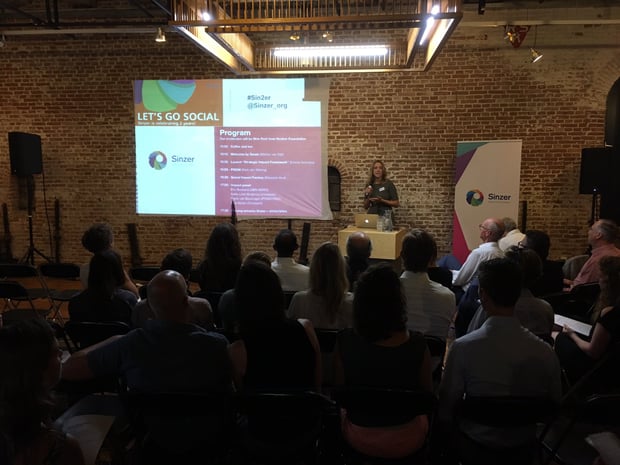
After the successful launch of Sinzer two years ago, we felt it was time to celebrate our successes as well as share some of our clients’ best practices. We therefore organised our event “Let’s Go Social” which took place the 15th of September. Around 120 people from a wide range of organisations attended the event to celebrate Sinzer’s 2nd anniversary with us.
The diversity of the organizations attending was a good reflection of our client base. Impact investors, social enterprises, charities, corporates, foundations, municipalities etc., they were all there. What links these organisations however is a common goal: the aim to create positive change in society. Whatever that change or impact may be.
Different organisations create and manage impact in different ways – which inspired us to give the stage to two of our clients from totally different markets that are both using Sinzer as the solution for impact management: one institutional investor (PGGM) and one municipality (Utrecht). Both are investing resources to create social impact: PGGM through their investments in listed companies that are labelled “solutions” and Utrecht through their government procurement and working with social enterprises in this regard.
Understanding how your investment is creating change can be achieved by measuring the impact of the solution, social enterprise, intervention or project you are investing in. What problem do you want to solve? Is your investment being spent most effectively in order to accomplish that?
Impact measurement helps you gain insights that can help you improve and maximise social impact. This point was stressed during our impact panel with Kellie Liket (researcher at Erasmus University), Lara Muller (Owner OnImpact), Eric Buckens (director from ABN AMRO Social Impact Fund) and Maarten van Dam (Managing Director from PYMWYMIC). Kellie’s perspective was to measure the impact of interventions from an academic perspective and when implementing the proven intervention(s) to focus on measuring the on-going performance it. Lara pointed out that – from a corporate view – there needs to be a underlying business model in the first place in order to create social impact. Its measurement should be done with a few metrics that everyone can understand. Eric urged the importance of a “true price or value” in order to compare different social enterprises in which their fund invests. Maarten noticed that impact measurement should also be valuable for the investee and not only for the investor as well as not over-burdening the investee too much.
As Sinzer we believe in a world where organizations strive to maximise their social impact as much as their financial value. In order to do so, we believe that organizations need to treat social impact management as seriously as financial management.
The question is: is this yet the case?
We definitely see the market for social impact management maturing: an increasing amount of organizations is starting to use social impact management systems.
At the same time however there is still a lot of talking (instead of doing) about social impact. Common phrases we often hear are:
“Social impact measurement is too difficult; a single standard is lacking. I want an easy but rigorous way of measuring it” followed by “it should not cost too much money”.
To draw a comparison with financial management: drafting a profit and loss account is not easy, nor is making cash flow projections or setting up a balance sheet. That’s why organisations are usually spending a fair amount of resources on these activities. Even when creating financial value is not the organisation’s core mission. Bookkeepers and accountants are hired; financial management solutions are purchased – because these give us the insight we need to maximise our financial value.
If an organisation’s core mission is to create societal value, it follows that this organisation will need information to maximize that social impact. When it comes to allocating resources to consultants and impact management systems, most organisations are reluctant to do so. We envision a new paradigm in which insights in social value creation are given as much importance and prominence as insights in financial value creation. In the end these social value insights will help organisations maximise social impact, make better decisions and be accountable to stakeholders.
We therefore launched our Strategic Impact Framework, which supports organisations to develop their own bespoke social impact management framework. Interested to learn more about this framework? Download the presentation and request a free demo.
-1.jpg?width=232&name=GT%20Sinzer_logo_screen_descriptor%20(1)-1.jpg)


